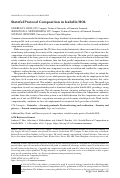Stateful Protocol Composition in Isabelle/HOL
by Andreas V. Hess, Sebastian A. Mödersheim, and Achim D. Brucker
 Communication networks like the Internet form a large distributed system where a huge number of components run in parallel, such as security protocols and distributed web applications. For what concerns security, it is obviously infeasible to verify them all at once as one monolithic entity; rather, one has to verify individual components in isolation.
Communication networks like the Internet form a large distributed system where a huge number of components run in parallel, such as security protocols and distributed web applications. For what concerns security, it is obviously infeasible to verify them all at once as one monolithic entity; rather, one has to verify individual components in isolation.
While many typical components like TLS have been studied intensively, there exists much less research on analyzing and ensuring the security of the composition of security protocols. This is a problem since the composition of systems that are secure in isolation can easily be insecure. The main goal of compositionality is thus a theorem of the form: given a set of components that are already proved secure in isolation and that satisfy a number of easy-to-check conditions, then also their parallel composition is secure. Said conditions should of course also be realistic in practice, or better yet, already be satisfied for many existing components. Another benefit of compositionality is that when one would like to exchange a component with another one, all that is needed is the proof that the new component is secure in isolation and satisfies the composition conditions-without having to re-prove anything about the other components.
This paper has three contributions over previous work in parallel compositionality. First, we extend the compositionality paradigm to stateful systems: while previous approaches work only for simple protocols that only have a local session state, our result supports participants who maintain long-term databases that can be shared among several protocols. This includes a paradigm for declassification of shared secrets. This result is in fact so general that it also covers many forms of sequential composition as a special case of stateful parallel composition. Second, our compositionality result is formalized and proved in Isabelle/HOL, providing a strong correctness guarantee of our proofs. This also means that one can prove, without gaps, the security of an entire system in Isabelle/HOL, namely the security of components in isolation, the composition conditions, and thus derive the security of the entire system as an Isabelle theorem. For the components one can also make use of our tool PSPSP that can perform automatic proofs for many stateful protocols. Third, for the compositionality conditions we have also implemented an automated check procedure in Isabelle.
Keywords: protocol composition, stateful security protocol, Isabelle/HOL
Categories: ,
Documents: (full text as PDF file)
 Please cite this article as follows:
Please cite this article as follows:
Andreas V. Hess, Sebastian A. Mödersheim, and Achim D. Brucker.
Stateful Protocol Composition in Isabelle/HOL.
In ACM Transactions on Privacy and Security, 2023.
Keywords: protocol composition, stateful security protocol, Isabelle/HOL
(full text as PDF file) (BibTeX) (Endnote) (RIS) (Word) (

| abstract | = | {Communication networks like the Internet form a large distributed system where a huge number of components run in parallel, such as security protocols and distributed web applications. For what concerns security, it is obviously infeasible to verify them all at once as one monolithic entity; rather, one has to verify individual components in isolation.\\\\While many typical components like TLS have been studied intensively, there exists much less research on analyzing and ensuring the security of the composition of security protocols. This is a problem since the composition of systems that are secure in isolation can easily be insecure. The main goal of compositionality is thus a theorem of the form: given a set of components that are already proved secure in isolation and that satisfy a number of easy-to-check conditions, then also their parallel composition is secure. Said conditions should of course also be realistic in practice, or better yet, already be satisfied for many existing components. Another benefit of compositionality is that when one would like to exchange a component with another one, all that is needed is the proof that the new component is secure in isolation and satisfies the composition conditions---without having to re-prove anything about the other components.\\\\This paper has three contributions over previous work in parallel compositionality. First, we extend the compositionality paradigm to \emph{stateful systems}: while previous approaches work only for simple protocols that only have a local session state, our result supports participants who maintain long-term \emph{databases} that can be \emph{shared} among several protocols. This includes a paradigm for \emph{declassification of shared secrets}. This result is in fact so general that it also covers many forms of \emph{sequential composition} as a special case of stateful parallel composition. Second, our compositionality result is formalized and proved in Isabelle/HOL, providing a strong correctness guarantee of our proofs. This also means that one can prove, without gaps, the security of an entire system in Isabelle/HOL, namely the security of components in isolation, the composition conditions, and thus derive the security of the entire system as an Isabelle theorem. For the components one can also make use of our tool PSPSP that can perform automatic proofs for many stateful protocols. Third, for the compositionality conditions we have also implemented an automated check procedure in Isabelle.}, | |
| address | = | {New York, NY, USA}, | |
| author | = | {Andreas V. Hess and Sebastian A. M{\"o}dersheim and Achim D. Brucker}, | |
| journal | = | {ACM Transactions on Privacy and Security}, | |
| keywords | = | {protocol composition, stateful security protocol, Isabelle/HOL}, | |
| = | {https://www.brucker.ch/bibliography/download/2023/hess.ea-stateful-protocol-composition-2023.pdf}, | ||
| publisher | = | {ACM Press}, | |
| title | = | {Stateful Protocol Composition in Isabelle/HOL}, | |
| url | = | {https://www.brucker.ch/bibliography/abstract/hess.ea-stateful-protocol-composition-2023}, | |
| year | = | {2023}, |